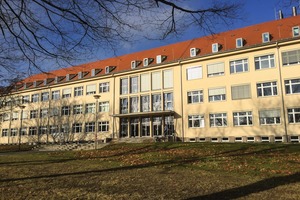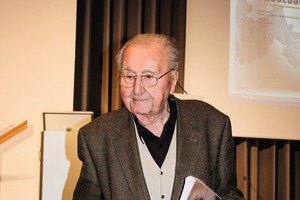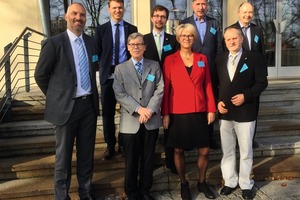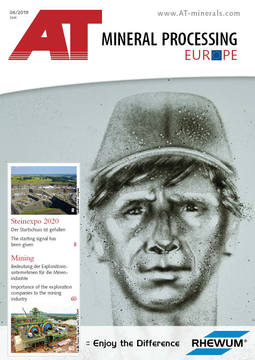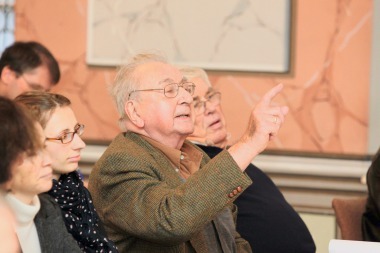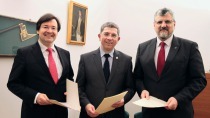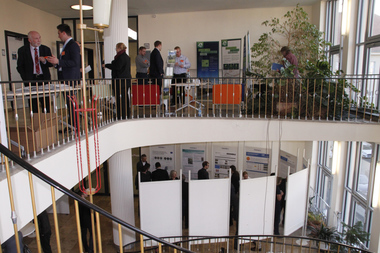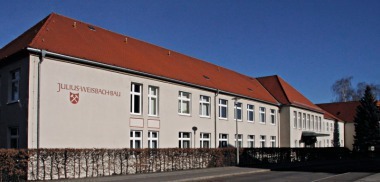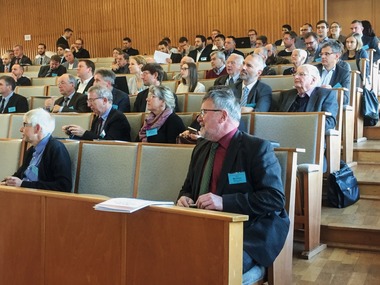Mineral Processing and Recycling –
14 and 15 November 2018 in Freiberg, Part 1
After opening of the conference by Dipl.-Ing. Silke Thümmler, Chairman of UVR-FIA e.V., Dr Andre Kamptner, one of the Managing Directors of UVR-FIA GmbH, kicked off with an insight into the company‘s current fields of work. In the opening session, in eight papers, the life‘s work of Prof. Heinrich Schubert, who died in spring 2018, was commended. In the further 16 papers and ten posters, reports were given on current issues in the processing of primary raw materials, recycling, and the development of machinery and apparatus. In the afternoon session of the first day of the conference, the poster authors had the opportunity to present their papers in a short form. At an evening function in the Schankhaus 1863 of the Ratskeller, a restaurant in Freiberg, sharing and discussion of ideas were continued in a relaxed atmosphere. On the afternoon of the second day of the conference, the opportunity had been arranged for attendees to view the facilities at UVR-FIA GmbH and the HIF.
Here, information is provided on the papers and posters on the different topics at the event.
Lectures honouring Prof. Heinrich Schubert
With the talk “Heinrich Schubert, one of the real greats in his field worldwide: an attempt at a eulogy”, Prof. Dr habil. Klaus Husemann, as the director successor to Prof. Schubert‘s chair, gave an accomplished profile of the work of Dr. sc. techn. Drs. h.c. Heinrich Schubert, long-serving Director of the Institute of Mineral Processing and later the science department of Mechanical Process Engineering and Mineral Processing at Freiberg University of Mining and Technology, who died on 9 April 2018 at the age of 92 years. Prof. Schubert was one of the most esteemed scientists and university professors in his field worldwide. He has therefore contributed in a major way to the standing of Freiberg University of Mining and Technology both in Germany and abroad.
Heinrich Schubert was born on 23 January 1926 in Pirna-Jessen near Dresden. From 1947, he studied at Freiberg Mining Academy and completed his studies as a graduate engineer in mineral processing in 1951 and as a graduate engineer in mining in 1952. After this, he worked until 1960 in Mansfeld copper slate mining, amongst other things, as Technical Director in the Vereinigung Volkseigener Betriebe (VVB – Association of State-Owned Enterprises) for the Non-Ferrous Metals Industry in Eisleben. In 1956 he earned his doctorate with his thesis on “Floatability and structural relations in cation-active flotation” and in 1971, he became Dr. sc. techn. with work on the topic “Role of the association of non-polar groups in collector adsorption”. In 1960, Heinrich Schubert was appointed to succeed Prof. Helmut Kirchberg as Professor of Mineral Processing and from 1969 as Professor of Mechanical Process Engineering and Mineral Processing at Freiberg University of Mining and remained there until his retirement in 1991.
He developed the then “Institute of Mineral Processing” in the following years to a modern equipped place for teaching and research, the teaching and research spectrum of the Institute being extended in the direction of mechanical process engineering, which is documented in the name of the science department “Mechanical Process Engineering and Mineral Processing”. In the course of his many years of work at the Institute, 550 students as well as 60 doctoral candidates have been guided and mentored. Of these, eight work or have worked themselves as university professors. Prof. Schubert also taught at universities in Queensland/Australia, lowa/USA and Wuhan/China.
Certainly worthy of note are his still very relevant text- and handbooks “Aufbereitung fester mineralischer Rohstoffe” (Processing of Solid Mineral Resources” – three volumes in several editions), “Mechanische Verfahrenstechnik” (“Mechanical Process Engineering”, leading author, three editions), “Handbuch der Mechanischen Verfahrenstechnik” (“Handbook of Mechanical Process Engineering” – two volumes, editor and co-author).
Prof. Schubert always pursued the concept of developing a physically sound theory or process model to solve process-related problems, to enable comprehensive penetration of a subject. Important to him here were the close relationship between theory and experiment and the unity of teaching and research. The focuses of Prof. Schubert and his colleagues‘ research activities included mechanical separation processes, individual and collective particle comminution, turbulent multiphase flows, flow properties of bulk solids and interaction (adhesive forces) between the particles, mineral processing and recycling of waste and secondary resources. The findings of this research are documented in over 300 publications and numerous patents.
Prof. Schubert was a member of numerous national and international scientific committees and the advisory boards of several internationally renowned journals, e.g. Int. Journal of Mineral Processing, Particle Characterisation, Advanced Particle Technology (Japan) and KONA (Japan).
Of his awards, the following are mentioned here: National Award of the GDR for Science and Technology, Dr. h.c. TU Miskolc in Hungary, Dr.-Ing. e.h. TH Leuna-Merseburg, Hans-Rumpf Medal of the Deutschen Vereinigung für Chemie- und Verfahrenstechnik (German Association of Chemical and Process Engineering) and the Life-Time Achievement Award of IMPC – International Mineral Processing Congress. Not to be forgotten is also Prof, Schubert‘s involvement in the university administration from 1963 to 1975 as prorector for science development and research, and 1980 to 1991 as Dean of the Faculty of Technical Sciences.
Following on from the observations of Prof. Husemann, Prof. Dr. Urs A. Peuker, the current holder of the Chair at the Institute of Mechanical Process Engineering/Mineral Processing at Freiberg University of Mining and Technology, gave his “Laudation for Prof. Heinrich Schubert (Future)“ and emphasized that many of his scientific visions still had sustained importance even today. Further, he informed attendees about current research projects at the Institute, e.g. on the interaction of particles and gas bubbles, on the effect of capillary forces, on mechanical separation techniques of particles and basic processes in mechanical process engineering (comminution, classification, filtration, etc.).
In other papers, speakers who were direct students of Prof. Heinrich Schubert and currently active scientists presented their findings in selected fields of work.
Dr Jens Hanisch (FAM Magdeburg) and Dr Thomas Mütze (MVT/AT TU Bergakademie) reported on the “Freiberg Comminution School”. In around 1960, in Germany, extensive fundamental research began in the field of microprocesses in comminution that was soon acknowledged worldwide. The “Karlsruhe School” established by Hans Rumpf and later continued by Klaus Schönert in Clausthal-Zellerfeld, as well as the research work of the “Freiberg School” under the direction of Heinrich Schubert led to significant insights with regard to the scientific penetration of the comminution behaviour of brittle materials.
One central issue was how far the per se chaotic crack growth and the resulting comminution performance can be described mathematically and made accessible for process modelling. Starting from analyses of individual particle comminution of regularly shaped particles of various materials subjected to compressive and impact stress up to the stressing of particle collectives (multiparticle layers) of irregularly shaped particles, physically sound models were developed. With thin section analyses, it was proven that the size distribution of the finest sub-collective of the comminution product corresponds to the size distribution of the primary particles in the mineral microstructure. The particles of the coarsest sub-collective correspond to the order of magnitude of the starting materials, that of the medium-size sub-collective to the break-off of corners and edges. As the distribution parameters of the sub-collectives are largely independent of the energy input, it was possible for the first time to describe the comminution progress solely as a relationship between the mass fractions of the sub-collectives and the energy input.
All works of Heinrich Schubert‘s “Freiberg School” were based on the endeavours to describe the microprocesses of comminution with physically based models. These endeavours form to this day in Freiberg the basis for further scientific work in the field of comminution. Besides the work on the comminution behaviour of non-brittle materials which the science department “Mechanical Process Engineering and Mineral Processing” under Prof. Gert Schubert worked on especially in respect of the processing of metallic secondary resources, material bed comminution is a current focus on account of the complex interactions of the microprocesses that take place consecutively and parallel. In material bed comminution, process-determining redistribution and flow processes take place that, with increasing stress intensity, go over into a strong compaction of the material and only into fracture processes in association with this. For process intensification with the use of relatively large comminution machines (e.g. high-pressure roller mills or vertical roller mills) or throughput rate increases with faster drives, the questions of the compaction behaviour and the flow-through of material beds are of fundamental interest for modern comminution research.
On “Freiberg research on flotation under the direction of Prof. Heinrich Schubert and its application in industry” reported Dr Wolfgang Schubert (kronos titan, Norway). In the 1960s, the potash industry in the GDR contacted the Freiberg Department of Mineral Processing, which was under the direction of Prof. Heinrich Schubert, with the request to become cosponsor of processing technology in Zielitz. This was about comminution, classification and especially the separation process. As an alternative to the traditional hot dissolution process, for economic and environmental protection reasons, modern cation-active amine flotation was preferred. The mechanisms of selective adsorption of amines on NaCl and KCl were elucidated, the role of the association of the non-polar groups in collector adsorption was discovered by Prof. Heinrich Schubert. As Zielitz salt in a particle size of 1 mm is almost completely dissolved, flotation was performed in the range to 1 mm. The influence of hydrodynamics on the floatability of different particles sizes was established and principles on the process control of fine and coarse particle flotation elaborated.
While Zielitz flotation started in those day with respectable 6 m3 cells, today 300 m3 are not rare today worldwide and the maximum is 700 m3. These large cells take into account the findings of flotation hydrodynamics, the basics of which were worked out by Prof. Heinrich Schubert and his colleagues. The Zielitz plant became a “flagship” in the potash collective and maintained this position with K+S after German reunification. The Freiberg department under the direction of Prof. Heinrich Schubert played a significant part in this.
With the paper “A fine future – Why flotation is still a Freiberg research focus after Schubert and Schulze”, Dr Martin Rudolph (HZDR Dresden, HIF) added to observations on flotation research in Freiberg. Dr Rudolph had had, together with the Vietnamese PhD candidate Mr Duong, since 2013 the opportunity to regularly meet up with Prof. Schubert and to use his experience in flotation research to set up a modern flotation laboratory with a focus on mineral processing at the HIF, which had been established in 2011.
In this connection, Dr Rudolph stressed that the Freiberg flotation research under the guidance of Prof. Heinrich Schubert and, however, also of Dr Hans Joachim Schulze (former colleague of the FIA Freiberg, deceased in 2003) still garners attention at various international conferences, including the IMPCs in the years 2012 and 2016 and MEI Flotation in 2013, 2015 and 2017. The HIF will especially address the work fields of ultrafine particle flotation, complex polymetallic resources, bioflotation, water management and fundamental research on mineral boundary surfaces. New analysis tools like the atomic force microscope or the methods of automated mineralogy enable better analysis of the heterocoagulation separation of fine particles.
Speaking on “Prof. Heinrich Schubert – Initiator of the Freiberg School on recycling – Processing of waste-derived resources”, Prof. Dr Sylvia Dannewitz (HS Nordhausen) gave a very personal talk. In the scope of her study of mineral processing and her doctorate on spar flotation completed in cooperation with Prof. Bahr (TU Clausthal), she was able from 1982 to1993 to take with her very important impetus for her further development. Already during her studies, Prof. Heinrich Schubert had imparted the importance of recycling for assuring the future supply of resources, inspiring her to work actively in the field of waste management and recycling for several years in a large engineering office as well as at universities such as the Bauhaus University in Weimar and the FH Jena. With the appointment as first professor of the newly founded Nordhausen University of Applied Sciences, a technical course of study was established that was based on the use of waste as important resource. Associated with this was the set-up of numerous process engineering laboratories and the pilot testing centre at the August Kramer Institute in Nordhausen.
From the beginning, research projects with field partners on the processing of mixed settlement waste, material recycling and land recycling (e.g. the recultivation of potash heaps) had the highest priority, In addition, for around ten years now, the University has organized the Nordhausen Secondary Resources Workshop. Especially successful is the research cooperation with TU Clausthal, where the joint application in the framework of a larger consortium on Zwanzig20 with the topic “Recycling 2.0 – the recyclables turnaround” led to success and finally after further stages to the creation of a research centre at the HS Nordhausen, the future Thüringer Innovationszentrum Wertstoffe. Especially the Mineral Processing and Recycling Conference in Freiberg enabled Prof. Dannewitz to meet annually again with Prof. Schubert and discuss with him the papers presented, which encouraged her to continue working in line with his ideas.
Dr. Hans-Georg Jäckel (TU Bergakademie, IMB/RM) was as a mineral processing machine engineer never a direct student of Prof. Heinrich Schubert, but “only” a student of his student, Prof. Gert Schubert. As a visionary, Prof. Heinrich Schubert encouraged very early a study of “metallic secondary resources”. Consequently, he prompted his then graduate Gert Schubert to develop technologies for metal recovery for the strained GDR raw material base. The first electronics scrap processing plant probably in Europe was then started up in Berlin-Hoppegarten back in 1967. Prof. Heinrich Schubert followed the diverse recycling projects attentively. After his retirement, he was still very much present at the MVT/AT Institute of the TU Bergakademie and on hand to offer his experience during directional discussions.
The success of the concept effected moreover a systematic expansion in the direction of metal comminution and sorting of metal-containing mixed secondary resources, which led to a professorship “Processing Technology and Recycling” under the direction of Prof. Gert Schubert from 1992 to his retirement in 2005. The approach, a principle idea of dividing the process into individual steps, to analyse these separately and bring them together for an overall understanding is the foundation of the “Freiberg School” of Prof. Heinrich Schubert and explained its past world standing in many fields of research.
In his observations, Dr Jäckel made several critical remarks on the current situation at universities and colleges in respect of the accumulation of process-related basic knowledge, which as a result of a reorientation to special performance indicators for the assessment of university institutes that are completely unrelated to industry, like the number of international publications, third-party revenue, is attracting less attention. The efforts to continue recycling activities led in 2005 to affiliation as a working group “Recycling” to the IAM (Prof. Georg Unland, Dr Thomas Folgner). In 2013, a separate professorship “Recycling Machinery” was established at the Institute of Mechanical Engineering (IMB-RM). With the student potential of the specialist “Recycling” option in the “Environmental Engineering” course, a large number of assignments from the medium-sized scrap industry have been supervised, in the course of the years around 250 student dissertations being completed on recycling. Solely to support the build-up of one of the most efficient recycling centres for end-of-life vehicle scrap in Europe in Espenhain near Leipzig (SCHOLZ Recycling; SRW metalfloat), around 50 student dissertations have been completed since 2003. With the intended phasing out of the IMB-RM in 2019 and the transition to the Chair “Connected Mobile Machinery”, a line is being drawn under the successful development so far. It remains to be seen how things will develop in future with application-oriented mechanical secondary resource processing (“recycling”) at the TU BAF.
Part 2 of the proceedings will be followed in the next issue of AT MINERAL PROCESSING.
Gesellschaft für Verfahrenstechnik UVR-FIA e.V. Freiberg

